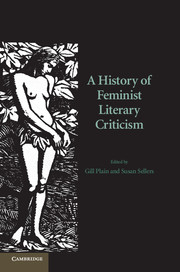Book contents
- Frontmatter
- Contents
- Acknowledgements
- Notes on contributors
- Introduction
- PART I PIONEERS AND PROTOFEMINISM
- PART II CREATING A FEMINIST LITERARY CRITICISM
- PART III POSTSTRUCTURALISM AND BEYOND
- Introduction to Part III
- 12 Feminist criticism and poststructuralism
- 13 Feminist criticism and psychoanalysis
- 14 French feminist criticism and writing the body
- 15 Postcolonial feminist criticism
- 16 Feminist criticism and queer theory
- 17 Feminist criticism and technologies of the body
- Postscript: flaming feminism?
- Index
- References
12 - Feminist criticism and poststructuralism
Published online by Cambridge University Press: 05 June 2012
- Frontmatter
- Contents
- Acknowledgements
- Notes on contributors
- Introduction
- PART I PIONEERS AND PROTOFEMINISM
- PART II CREATING A FEMINIST LITERARY CRITICISM
- PART III POSTSTRUCTURALISM AND BEYOND
- Introduction to Part III
- 12 Feminist criticism and poststructuralism
- 13 Feminist criticism and psychoanalysis
- 14 French feminist criticism and writing the body
- 15 Postcolonial feminist criticism
- 16 Feminist criticism and queer theory
- 17 Feminist criticism and technologies of the body
- Postscript: flaming feminism?
- Index
- References
Summary
POSTMODERNISM AND POSTSTRUCTURALISM
In contrast with the term ‘postmodernism’, it is possible to give a quite strict sense to ‘poststructuralism’. Whereas postmodernism encompasses movements in the arts, theory and popular culture, and is dated variously depending upon just which modernism the ‘post’ is seen to qualify, poststructuralism refers to a quite specific consequence of accepting the premises of structuralism. Structuralism insists that no term has meaning in itself but can only be identified in relation to other terms; poststructuralism investigates the emergence of systems of relations. Poststructuralism is often identified as a general movement including the works of Jacques Derrida, Michel Foucault, Luce Irigaray, Julia Kristeva, Jean-François Lyotard, Jacques Lacan and Gilles Deleuze, all of whom both accepted and criticised aspects of the structuralist movement. Poststructuralism might also be marked by the threshold date of May 1968 (the Paris student uprising that challenged the authority of party-political action), when French thinkers turned away from directly Marxist forms of politics. Far from thinking that ideology might be unmasked by a proletariat who had a direct experience of labour and capital, post-68 thinkers paid more attention to ideology as a positive, constructive and semi-autonomous force (Althusser, 1972). Literature would therefore be neither a reflection nor a distortion of reality but a crucial component in the recreation of conditions of consciousness. The ‘unhappy marriage’ that had existed between Marxism and feminism, which had tried to explain women's condition on the basis of the division of labour, could now give way to forms of feminism attentive to the images, figures, metaphors and myths through which both men and women live their reality.
- Type
- Chapter
- Information
- A History of Feminist Literary Criticism , pp. 214 - 234Publisher: Cambridge University PressPrint publication year: 2007



